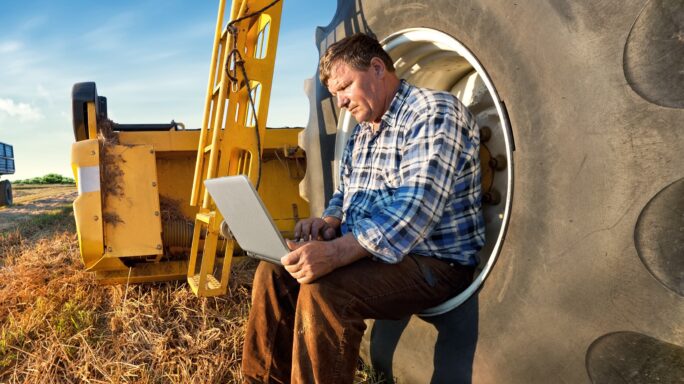Strategy, Legal & Operations
A profitable planet: How climate literacy can boost your bottom line
Discover the benefits of climate literacy and how having a deep understanding of climate change can help you run your business for the better.

Climate change reverberates in every corner of your life. The weight of responsibility doesn’t just fall on governments or corporations.
Small and medium-sized enterprises (SMEs) are the unsung heroes of global economies and play a pivotal role in shaping our environmental future. Collectively, you employ vast numbers of people, drive innovation, and influence local communities.
Yet, while you may be aware of the broader strokes of the climate crisis, you might not necessarily have a deeper, nuanced understanding—what we term ‘climate literacy’.
This literacy isn’t merely a badge of honour, it’s a crucial tool for survival, resilience, and growth.
Here’s what we cover in this article:
- What is climate literacy?
- The difference between climate change ‘informed’ and ‘literate’
- Why SMEs are central to the climate conversation
- Business risks caused by climate change
- SMEs are agile and adaptable
- 4 benefits of being climate literate
- Educate leadership and employees
- Understand inconsistencies with reporting
- Collaborate with experts
- Final thoughts
What is climate literacy?
Climate literacy goes beyond a basic awareness or knowledge of climate change.
It represents a deeper level of understanding, where individuals possess the necessary knowledge, skills, and attitudes to effectively engage in conversations and take informed action regarding climate-related issues.
Climate literacy empowers you to make sustainable choices and contribute meaningfully towards addressing climate change’s challenges.
The difference between climate change ‘informed’ and ‘literate’
- Being climate-informed generally suggests having a basic grasp of the concept.
- Climate literacy transcends mere awareness by implying a comprehensive understanding of the science behind climate change, its potential impact on the environment and society, and the actionable steps you can take to mitigate and adapt to these changes.
Liana Fricker is the founder of Inspiration Space, which provides a Carbon Literacy course backed by the United Nations, providing attendees with a certification demonstrating an awareness of climate-related risks and their impact on business.
She says: “While I had some awareness of the climate crisis, it wasn’t until I underwent carbon literacy training and subsequently launched a carbon literacy accelerator that my perspective fully shifted.
“I understood you can’t confine climate conversations to specific sectors or groups. It’s a holistic approach that must permeate every facet of our lives and thoughts. When this happens, I believe real, positive change will emerge.”
A holistic understanding is the key to climate literacy. It encompasses three core pillars: science, impact, and action.
Climate change science
Firstly, having a solid grasp of the science behind climate change helps you comprehend the mechanisms driving it and recognise the evidence supporting this phenomenon.
Understanding the science empowers you to navigate complex and nuanced climate change discussions.
Climate change impact
Next, a comprehensive understanding of the impacts of climate change is vital.
Climate change has far-reaching consequences across ecosystems, economies, and communities. By exploring and acknowledging these effects, you develop a sense of urgency, empathy, and responsibility to act.
It also helps you identify vulnerable populations and areas that require targeted solutions.
Climate change action
Lastly, climate literacy emphasises the importance of actions. It encourages us to move beyond passive awareness and embrace our role as change agents.
Liana says you can’t effectively establish, manage, or work in a business without at least a foundational level of climate literacy.
She says: “Entrepreneurs should be planning their financial budgets and assessing their ventures’ carbon footprint and resource consumption.”
It may be that you’re already practising sustainability but you’re not familiar with the terminology experts and environmentalists use. Being climate literate will help.
Why SMEs are central to the climate conversation
SMEs may seem small individually, but your collective influence on the environment is significant—you generate 44% of the UK’s non-household greenhouse gas emissions.
SMEs contribute to greenhouse gas emissions, resource consumption, and waste generation. Recognising and addressing your environmental footprint can substantially contribute to global sustainability goals.
However, a striking statistic from Sage and the International Chamber of Commerce (ICC) says only 36% of SMEs have publicly communicated a net-zero target as part of their efforts to fight climate change.
If you’re a UK business looking to understand your carbon footprint, Sage Earth is a carbon accounting platform that makes it easy to measure your emissions, including those of your suppliers.
Business risks caused by climate change
Climate change could pose significant risks to your business in the future, so now’s the time to be proactive and build resilience.
For example:
- Supply chain disruptions caused by extreme weather events can disrupt operations and lead to financial losses.
- Regulatory changes to reduce carbon emissions and promote sustainability may require adapting your practices and complying with new standards.
- Shifting consumer preferences towards environmentally friendly products and services can significantly affect your business if you fail to meet these demands.
- Fluctuations in energy costs can influence your bottom line, especially if you rely heavily on energy-intensive processes.
- As governments and municipalities increasingly prioritise energy efficiency and sustainability, new building standards and renovation mandates can emerge.
Recognising and taking proactive steps to address these risks can futureproof your business and help you seize new opportunities.
Lucy Johnson is the founder of sustainable lifestyle consultancy Green Salon. She has a background as an environmental and political reporter for ITN.
Lucy says you need to understand the distinct impact of climate change on your business and what your proactive response to it will be.
She warns: “As we transition to a decarbonised world, many challenges arise. This transition brings the broader risks of a changing climate and more immediate effects.
“Carbon literacy zeroes in on the specifics of understanding carbon’s role and its implications for your business.”
SMEs are agile and adaptable
While the challenges may seem daunting, SMEs possess agility and adaptability, which are essential for navigating the climate landscape.
As an SME owner or leader, you can transform challenges into opportunities for growth, innovation, and increased competitive advantage.
By embracing sustainability, implementing environmentally friendly practices, and staying ahead of regulatory changes, you can position your business as a leader in your industry and cater to the evolving demands of customers who prioritise sustainable choices.
Liana Fricker says knowledge, inspiration, and finance are the primary drivers of many climate initiatives. But in her experience collaborating with businesses, one critical factor often holds them back: time.
Many business owners and leaders understand the urgent need for action. But they are uncertain about the next steps, especially when a simple Google search fails to provide the answers they seek.
Moreover, the complex language surrounding climate and carbon issues can be overwhelming. It can be like navigating uncharted territory without a map or guide.
4 benefits of being climate literate
1. Cost savings
It could help you find significant cost savings through energy efficiency and waste reduction.
By understanding the science behind climate change, you can identify ways to reduce energy consumption and waste generation, reduce your carbon footprint, and cut costs.
2. Risk management
It helps you understand and manage climate-related risks effectively.
You can identify vulnerabilities and develop effective adaptation strategies by getting your head around climate change and its potential effects.
Understanding the risks helps you prepare for potential disruptions and increases your resilience to climate-related shocks.
3. Opportunities for innovation
It empowers SMEs to tap into the green market and seize opportunities for innovation. Reframing and pivoting your business model with foresight can unlock tremendous potential.
The demand for environmentally friendly products and services is rising. By embracing sustainability principles, you can develop innovative business models, products, and services that cater to environmentally conscious consumers.
Climate literacy enables SMEs to identify opportunities and contribute to the green economy, driving market growth and differentiation.
Liana says businesses completing Inspiration Space’s climate literacy course have gained deeper insights into regulations and grant opportunities.
She says: “One was able to secure a £25,000 grant for solar panels on their newly purchased office, elevating its value.
“This became a notable talking point and earned them positive press from the grant body. It was beneficial from every angle.”
Liana says she’s also witnessed startups informed and shaped by education, making significant pivots even before launching, positioning them to be future-ready from the outset.
She adds: “When you can fluently discuss climate science and demonstrate carbon literacy, it opens doors to enriching conversations with knowledgeable and influential individuals.
“Indeed, we’ve seen participants leverage our programme to significantly expand their networks in the early phases of their ventures, often achieving far more than they might have solo.”
4. Reputation and brand management
It could help you find ways to enhance your sustainable reputation and brand image, attracting eco-conscious consumers and partners.
As consumers become more environmentally aware, they actively seek businesses aligning with their values.
If you embrace sustainability and communicate this effectively, your business can attract a loyal customer base that values ethical and environmentally friendly choices.
Additionally, climate literacy helps you build robust partnerships with like-minded organisations, creating opportunities for collaboration, growth, and positive impact.
To illustrate, consider the UK’s ethical consumer market. It surpassed the £100bn threshold, expanding to £141.6bn in 2022.
Lucy Johnson says: “This robust growth trajectory underscores the mounting emphasis consumers place on ethical spending.
“As climate risks intensify and consumer attitudes evolve, the opportunities for businesses to thrive sustainably will only magnify.”
Educate leadership and employees
You can attend climate literacy workshops, seminars, and online courses tailored specifically for SMEs.
These educational opportunities can provide valuable insights into the science of climate change, its effects on businesses, and strategies for sustainability.
Empowering leadership and employees with climate literacy creates a shared understanding and commitment to taking action.
Inspiration Space’s carbon literacy course, for example, is spread over three live workshops, using a combination of videos, discussions, and quizzes.
The aim is to educate businesspeople to comprehend the science of climate change, its associated terminology, and its relevance to their specific industries and roles.
Liana Fricker says the course attracts diverse participants, from marketers and accountants to metaverse startup founders, business coaches, and co-working space owners.
She says: “Climate change affects each of these people differently, presenting challenges and opportunities.
“Through our interactive sessions, they engage in dialogue, analyse regulations, and work together to strategise for the future.
“This hands-on approach ensures they’re not just absorbing theory but also taking actionable steps.”
If you have the finances, you may also be interested in undertaking academic certification programmes at institutions such as Harvard Business School or Cambridge University.
Lucy Johnson says: “These programmes provide an intense exploration of a business’s environmental sustainability and financial longevity.
“Essentially, they delve into the crucial balance between profit and purpose, which is at the core of contemporary business considerations.”
When discussing finance, especially if you’re a CFO, accountant, or financial director, it’s crucial to ensure that the business you manage, whether yours or someone else’s, is ready for the future.
Given the evolving legal landscape, you’ll want to understand regulations like the TCFD to ensure compliance.
Regulations could impact your financial and investment decisions—for example, certain banking products may soon be regarded as outdated or harmful.
Understand inconsistencies with reporting
Recognising inconsistency and a lack of uniformity in environmental, social and governance (ESG) and sustainability reporting across companies is important.
Many impact reports are produced in-house without a standardised template, meaning companies can choose selected sustainable policies to highlight. You may see inconsistent, fragmented, and sometimes misleading sustainability disclosures.
The disparate nature of these reports made it challenging for investors, stakeholders, and regulators to gauge and compare the true sustainability performance of businesses across borders.
However, two years ago, International Financial Reporting Standards introduced the International Sustainability Standards Board (SASB), marking a significant step towards standardisation.
The objective was to establish a global baseline for sustainability disclosures, which has the potential to revolutionise how businesses report and address their ESG impacts.
Lucy Johnson says: “At Green Salon, we’ve adopted the Sustainability Accounting Standards Board as our analytical foundation. We can assess companies using a consistent sustainability reporting lens.”
The consultancy aims to align its brands with these emerging global standards.
Lucy adds: “A centralised system like this is essential. It offers clarity and provides SMEs with insight into future regulatory expectations.”
Collaborate with experts
To enhance climate literacy further, consider partnering with environmental non-governmental organisations (NGOs), universities, and consultants specialising in sustainability.
These experts can provide guidance, conduct assessments, and offer tailored solutions to help your business navigate the complexities of climate change.
Collaborating with knowledgeable partners could add depth and credibility to your sustainability initiatives.
Lucy Johnson’s Green Salon consultancy offers various services tailored to businesses, from foundational carbon literacy to intricate climate-related assessments.
Green Salon will delve into how climate change could influence a particular business, often through factors like supply chains.
“Take a hypothetical fashion company that heavily relies on cotton, for example,” explains Lucy.
“If they face dwindling water supplies in cotton-growing regions like India, it threatens their immediate supplies and the broader financial sustainability of their business model.”
Adding to that complexity are potential regulatory measures regarding cotton and water usage.
Furthermore, shifting consumer preferences towards more sustainable alternatives, such as the Better Cotton Initiative or certified organic cotton, introduces another layer of challenges.
Lucy says: “Suddenly, as a fashion enterprise, you’re navigating a storm of risks.”
Green Salon will sit with such a company, conduct a thorough risk assessment, and explore available opportunities.
These might include pivoting to recycled fabrics, venturing into the preloved clothing market, or other innovative solutions.
Final thoughts
SMEs are pivotal in the global economy, and your influence extends deeply into environmental impact and the ongoing battle against the climate crisis.
Your collective actions have the potential to make monumental shifts in the way we, as a society, are heading regarding environmental sustainability.
The journey towards climate literacy should not be perceived as another task to check off a list. Instead, treat it as a golden opportunity.
Becoming climate literate opens doors to innovation, bolsters resilience against environmental and market shocks, and amplifies the potential for positive, sustainable, environmental and financial impact.
So take a moment to reflect on where your company stands in terms of climate literacy.
- Are you just informed, or are you truly literate?
- Do you recognise the broader implications of climate change for your business operations?
- Are you ready to adapt and thrive in this changing landscape?








Ask the author a question or share your advice